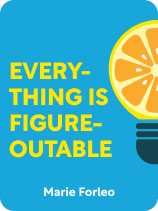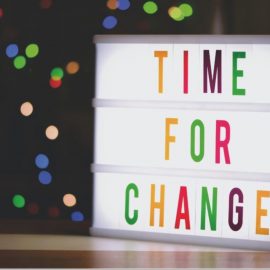

This article is an excerpt from the Shortform book guide to "Everything Is Figureoutable" by Marie Forleo. Shortform has the world's best summaries and analyses of books you should be reading.
Like this article? Sign up for a free trial here.
What is the key to focusing on one thing at a time? How can you select one goal to achieve?
It might be hard to only try to achieve one goal, but Marie Forleo’s book Everything Is Figureoutable says that’s the only way to live as though all issues are solvable. This doesn’t mean you have to limit yourself to one goal in life—just one at a time.
Read here how to focus on one thing at a time and get things done.
How to Select Just One Goal
To learn how to focus on one thing at a time, Forleo recommends that you start by writing down several goals for the next year. Then, select a few goals from the list, and rate how much each one matters to you on a scale of one to 10. Ignore any goals that rank below seven, as they’re not important enough to warrant your focus. If a goal is over seven, rate how hard achieving it would be on a scale of one to 10. (Rating the difficulty is not meant to discourage you but to provide clarity on what you’re signing up for and prepare you mentally.) Finally, if you’ve failed at this goal before, briefly describe why you failed and how you could act differently.
Once you have a few options, review your list and write down the single goal you’d like to spend your energy on—as Forleo notes, writing down your goal will increase the chances you’ll achieve it by 42%. This goal should be something you’re passionate about, not something society says you should want. And don’t feel pressured to take on a big goal. Your goals can be as small (or as big) as you want them to be—whether that’s mastering Chinese cuisine or attaining world peace.
(Shortform note: The origins of the statistic that writing down your goals will increase the chances you’ll achieve them by 42% are unclear. Other authors attribute it to a study by Dr. Gail Matthews, but her study doesn’t say that; it found that people who didn’t write their goals down achieved them at a 43% success rate, while people who did had a 60% success rate.)
Forleo says you’re more likely to stick to your goal through setbacks if you link it to a greater purpose. So while it’s OK to start pursuing a goal primarily for personal ambition, it’s better if you can link it to a loftier ambition that involves helping others. For example, your goal to master Chinese cooking might be a way to express your larger purpose of providing an environment in which your friends and family can deepen their social connections.
Once you’ve decided on your goal, Forleo recommends converting it into something specific that you can measure and act on. To start, think of three simple 10-minute things that you can do today to pursue your goal—and do them. Focus on things that are action-oriented rather than research-oriented (to avoid getting bogged down by research) and that are within your control (to ensure that success doesn’t depend on outside factors). For example, instead of “master Chinese cooking to impress my foodie friends,” write, “memorize five Chinese dishes.” Then, sign up for a Chinese cooking class instead of purchasing a cookbook.
| How Forleo’s Ideas on Selecting One Goal Compare to Gary Keller’s The One Thing Like Forleo, Keller states in The One Thing that linking your goal to a purpose is essential. However, he recommends starting with this purpose, which he calls your big One Thing, and defines as the thing you want your life to be about more than any other—even if that thing isn’t something that helps others. Moreover, he recommends starting with your purpose not because it helps you persist through setbacks but because it increases your happiness, which he contends occurs in the process of living according to your purpose. To discover your purpose, Keller recommends writing down a handful of activities (like a hobby) and outcomes (like bringing joy to others) you’re passionate about. Pick one activity and one outcome most important to you. Then, combine your activity and outcome to answer the question, “What’s the One Thing I can do that would mean the most to me, such that by doing it everything else would be easier or unnecessary?” Once you discover your ultimate purpose, Keller recommends that you find the smaller “one thing” at each stage that will help you get there. Working backward from your ultimate goal, figure out what one thing you need to do in the next 10 years, five years, one year, one month, one week, and today—for example, ask yourself, “What’s the One Thing I can do today to be on track to reach my goal for this week?” Keller notes that you’ll likely have several possible actions you can select for your One Thing. Rather than focus on short, action-oriented things that are within your control, Keller recommends that you do the thing that is possible but requires going beyond what’s been achieved before. To do this, start by researching ideas and role models to suggest a direction. Then, establish a benchmark—the highest level that’s been achieved so far—and look for the next level that you can achieve. |

———End of Preview———
Like what you just read? Read the rest of the world's best book summary and analysis of Marie Forleo's "Everything Is Figureoutable" at Shortform.
Here's what you'll find in our full Everything Is Figureoutable summary:
- How to apply the "everything is figureoutable" philosophy to your life
- How you can achieve your dreams and overcome all obstacles
- How to respond when you encounter criticism






